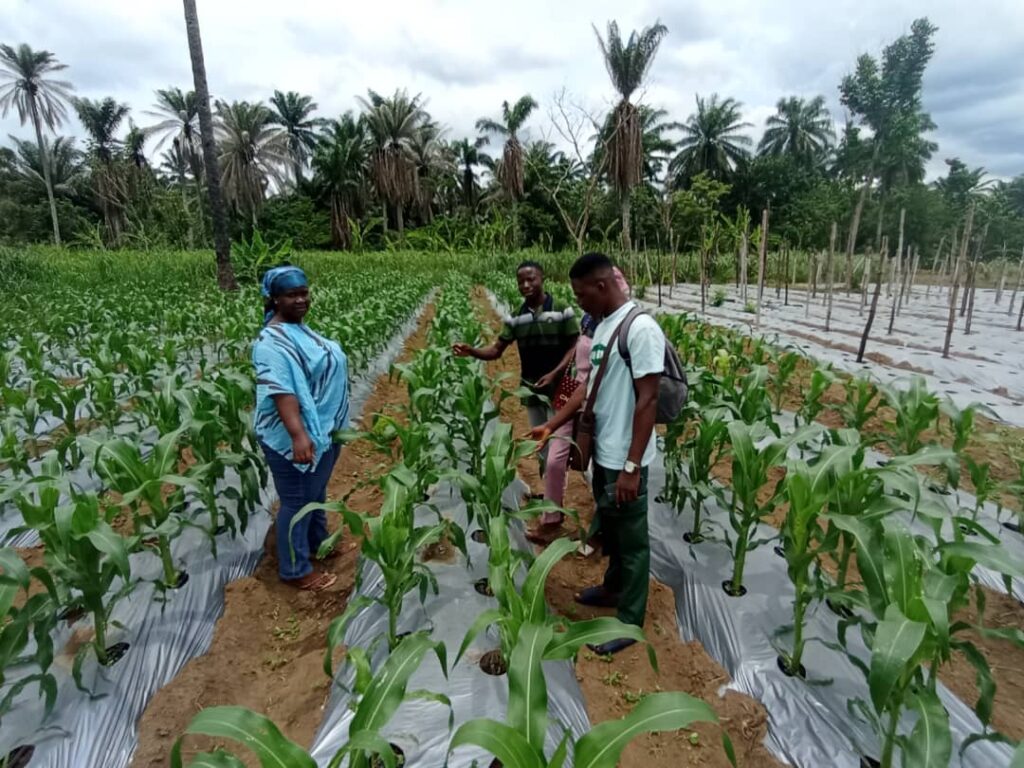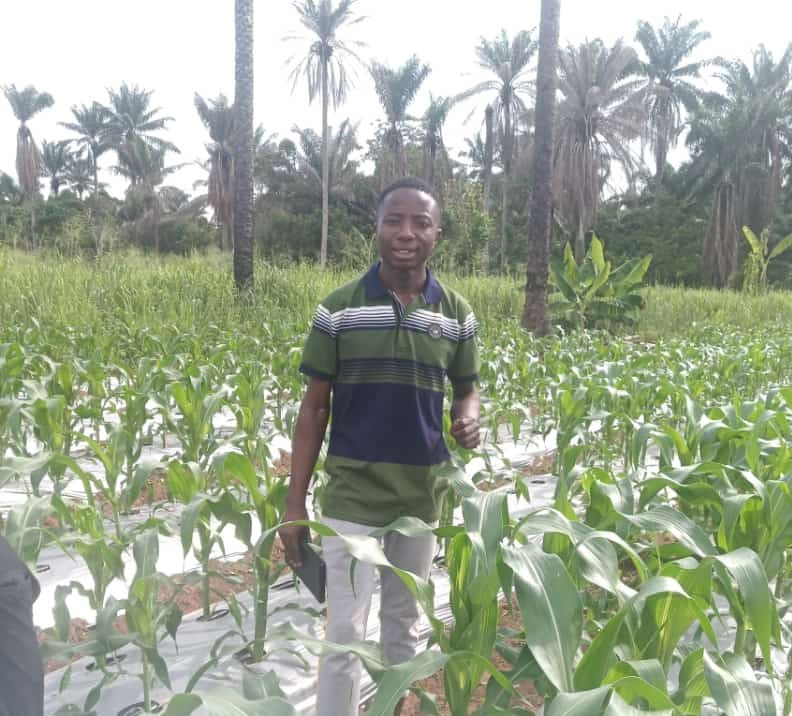Mr. Opeyemi Ajibola on his irrigated sweet corn farm.
In this interview with FarmingFarmersFarms, the 30-year–old Chief Executive Officer of Agriwas Farms, Aboke village, Ejioku, Oyo State, Mr. Ajibola Opeyemi, speaks on how individuals and agricultural companies allegedly rob farmers of their hard-earned money over farm labour. He laments how local farm labourers have become unreliable, thus impeding his farming production. Find out in the excerpts below, more about Agriwas Farms and other issues surrounding irrigated-farming:
How long have you been into agriculture?
I started cultivation as a 20-year-old young man. I started with two plots, but today, I have six acres and still counting. Presently, I run this farm alongside my master’s degree programme at the Federal University of Agriculture, Abeokuta (FUNAAB). I plant veggies like sweet corn, cucumber, tomatoes, cabbage, and others like, habaneros, chilli pepper, plantain, pawpaw, cocoa, oil palm – all on irrigation.
If you were to describe farming, what would you say, based on your experience?
Hmm, farming is very tasking. He who, does not have strong determination and passion, cannot engage in it well. For instance, I don’t see myself doing anything other than farming; maybe I could teach my skills or lecture what I have learnt on the field? I have one principle in life, if you want to do anything and succeed in it, cut every form retreat system around it, so that obstacles and limitations will not make you turn back.
What inspired you into venturing in agri-business here in Ibadan?
I started in this bush all by myself as an undergraduate student in 2013, who got a grant through our ‘work-earn and learn programme’. As at then, it was a free opportunity for any student willing to go through the training. After the training then, they allocated land for us and supplied tools too. Beyond the knowledge transfer, we were empowered with basically everything we needed to start. And that would be the first time in my life that I would carry hoe and cutlass.
Speaking of farm labour, how has been the experience for you, recruiting and getting people to work on this large expanse of land?
Some Nigerians are bad. We cannot solve our own problems the way we are going. You don’t often get Yorubas to work on the farm for you. It’s either you get the foreigners or northerners. For farm labour, you need to see tenacity, reliability, patience and endurance. The most reliable form of labour for us are the foreigners; unfortunately they are all gone because our currency and exchange rate is bad! Even when we try to reach out to some agriculture-service providers, through their agents in collaboration with the labour, they scam us. Those agents are the intermediaries; and despite being registered, they still find a way to rob us of our money. The workers they help you get will run away and still go back to them. What is most frustrating is, when these fleeing workers get to them, they will not alert you, the farmer, but rather, go ahead and recommend them to other farmers that request their services. These agents are everywhere; online and offline. If you ask many farmers on a commercial scale this year, using labour, many have been scammed. The last one that I was cheated really cost me a lot of money and that really got to me. I felt like not talking to anybody again.
Did you take any legal actions?
Well, the last agent that cheated me actually got exposed by one of the workers. The workers told us when we caught them that they were going back to their agents. But the agents denied, and countered that those guys were lying. One of my friends later called my fiancée, who runs the farm with me that, they sighted one of the workers in another farmer, who happened to be a colleague of mine. So at that time, I had to go to the police station. But we are still on the case, because I don’t really have time because of my studies.
What can you say is responsible for the hike in agricultural produce?
You see, a lot of people want to farm, but they cannot access reliable labour. One of the reasons why I think I am still surviving is because I can do practically everything on my farm. I can do irrigation, planting, harvesting and everything. Thank God for the few people that are with me; I could maintain some plots of land. Some of my landed (property) are not cultivated now because there is no labour. For every week, the goal is to sell, but when land is not cultivated, there will be no produce.

CEO of Agricwas Farms, Mr. Opeyemi Ajibola with some of his workers on the farm.
Since your farming is mostly irrigated, how do you source for water during the dry season since you are not close to a dam?
Early this year, due to scarcity of fuel, I dug a large well myself. Although, I have a borehole dug, but the cost of fuel and recent cash crunch crisis prompted my decision to have a natural source of water. The water is always there and never runs dry.
Speaking of water for irrigation, does dirty water affect cultivated plants?
In irrigation, there is the need for sufficient water, no doubt. However, the salinity of the water is very important for the growth of the crop. To avoid crop failure, we ensure the use of water with appropriate saline level. The electrical conductivity of the water is very significant, so you’ll have tested the salinity before applying to your farmland.

